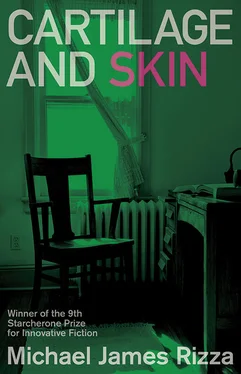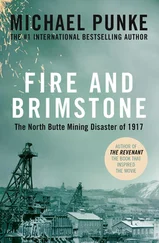I began an elaborate character study of him, although he offered me no more to build upon than silly poses of himself. Obviously, the ruling question, the key to the man, was why would he send these pictures to the idiot woman, who didn’t seem to care about them at all. His skin tone, facial features, and the shape of his head suggested to me that “W. McTeal” was surely not Irish, but probably Mediterranean. Possessed as I was, I ignored my work for a while and spent my time trying to discover a clue in his pseudonym. The fact that a teal is a short-necked wild duck helped me in no way, so I played with anagrams. Considering the pictures, I found something in “cwt. meal,” namely that the man regarded himself as a hundred pounds of meat. This failed on a literal level because the man was clearly over a hundred pounds and cannibalism didn’t seem likely — but in all probability he was speaking figuratively, as well as hyperbolically, about his penis, his hundred pound meal. Although it was fascinating to consider what kind of person would have such an exaggerated perspective, I ended up dismissing this anagram because he seemed more interested in his ass than in his sleepy penis, fellatio precluded. I arranged and rearranged the letters, and the only idea that made sense in the end was “wet clam.” I don’t need to say what thoughts followed this discovery, what threads of speculation dressed the man.
The central question still remained: Why the idiot woman?
It was early July when I opened my window a crack to listen to her hum. She was bovine to the bone, moving slowly, stooping over her basket — then with sudden deftness — snapping out this or that garment and putting it on the line. When she finished, she stayed with her clothes to watch them dry and presumably to guard them from thieves. She sat on a turned-over milkcrate and hummed “What Child Is This?” Because she stared blankly toward the street, I saw no reason to continue watching her.
I went back to my desk and booted up my computer, figuring that I should get some work done. I had enough personal troubles and didn’t need to worry about my neighbors. After a while, Claudia’s humming became a soft noise in the background. I was reworking a paragraph in my manuscript and suspected that I had misquoted a source. The book was on the nightstand beside my bed, so I left my desk to get it. When I came back, the humming was stopped and the blinds were scraping back and forth over the windowsill. I was terrified for a moment, standing dumbly, feeling inexplicably vulnerable and powerless. Then I was at the window. The alley was empty; the bovine idiot and her clothes were gone.
I shut the window and locked it. My apartment seemed foreign to me as I turned and scanned it, although nothing looked out of place. Claudia’s mail was still on the desk, my wallet still on top of the television. Soon I was giving my apartment a thorough search, thinking that maybe the boy had snuck in; lately he had been asking if he could watch my television and use my bathroom. But I was alone; nothing vile was coiled up in some dark corner; no monster crouched in the closet. The feeling of unease, though subsiding, didn’t completely leave me. That night I lay in bed, feeling a bit displaced, wondering what had moved the blinds. I was certain that someone would have been in my home, standing among my belongings, violating my valuables with lustful looks and grubby fingers, if I hadn’t been there.
The rest of the summer was a difficult period for me. Through a series of small misfortunes and an instance of bad timing, my social life began a slow decay, with every cherished piece turning color and falling off like a leprous appendage. As a result, my manuscript suffered. My home, however — where the boy would run up and down the street with a few other kids; my landlord would barely give me a passing nod in the hallway; my bloated-tongued neighbor, with or without laundry on the line, would sit on the milkcrate in the alley and hum; and the mystery man, though now with a unexpected welt on his ass cheek, would still look confusedly though his spread legs — entered into a holding period, a welcomed block of banality.
Sometime in late August, on a muggy evening when the sewers smelled a little more pungent than usual, I decided to take action, to force the moment to its crisis, to shake off a kind of prufrockian paralysis. I had just finished a long distance call to my mother, who had encouraged me to try to regain my social standing. I splashed water on my face and then looked at myself for a long time in the bathroom mirror. My face seemed so waxen that I thought if I pressed my thumbs into my flesh, they’d leave imprints. A recent bout with insomnia was rending my nerves. Although I was resolved to phone a man named Morris, I procrastinated by practicing what I would say, needing to get my tone, as well as my words, correct. But the actual sound of his voice asking, “What can I do for you?” with a flat, distant calmness, as if he were talking to a lamppost or a chew-toy for a dog, made me start to babble. I needed someone to understand my perspective, and Morris — with his thoughtful nod and his lazy gaze like a dream-struck lover — hadn’t completely turned on me. He was an empathetic man, well-respected in my circle of friends and colleagues. In fact, it was the sage Morris who had recommended that I get my own apartment, so I’d have the time and peace not only to devote to my manuscript but also to give the sore spots in my life a chance to heal. But mine was a chronic and leprous condition. I’m certain that as I talked to him on the phone, he smelled the festering rot; he knew that I needed him. I was pathetic; I pleaded, agreeing with him at every turn. He had helped me once before, yes, found me an apartment, yes, stuck by me when I was ousted, yes, my only friend, yes. In the end, he conceded to meet me for coffee, perhaps just to see what I had become or if anything left in me was worth saving. Before he hung up the phone, almost as an afterthought, he told me to bring the manuscript. He knew that a man’s labor was an unbearable burden if it had no purpose and no one even cared to glance at it. Such a simple comment made my heart swell with hope.
Even so, on this muggy night, in sewer reek and subway steam rising though grates to the sidewalk, I abruptly stopped walking and disregarded Morris. Suddenly, I didn’t care that he was waiting for me in a coffee shop. I couldn’t care. I was willing to lose my last connection to society. Perhaps my soul swooned, my poordjeli jouissanced, all at the sight of a young woman bending over to tie her sneaker. The elegance of her spine, the curve of her haunches, the liquid ease of her fingers among the laces, and the smooth outline, in the lamplight, of crease and crevice beneath her khaki shorts, was its own promise of life, of regeneration, of a hope that didn’t depend upon my degradation and another’s grace.
My Lord, may Morris rot in pieces.
Although I knew the street was otherwise empty, I gave a quick look around to make sure no one saw me staring so conspicuously at the woman. For my pleasure, when she made her nice little bow, she shifted her weight, put her other foot forward, untied and then re-tied that sneaker. Because I am more of a tactilian than a voyeur, I found myself stepping closer, wanting to get on my knees, on a dog’s level, and breathe her in. She straightened up and looked back at me. I nodded and walked past her, as if I had been walking all along and had just approached her at that moment.
I listened to her footfalls behind me, thinking that even her face was pretty, though in truth it looked haggard, with hollow cheeks and bleary eyes. I slowed my pace, until she was walking closer. Then, when it sounded as if she were right on my heels, ready to pass by me, I stopped. Her fingers brushed my back, her form slipped around me, and she continued on. Her words were gritty, as if her voice were scarred and scratched: “Excuse me.”
Читать дальше












